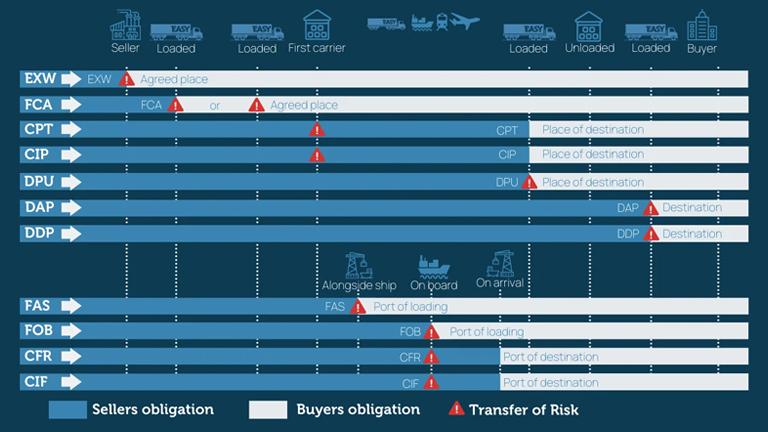In the intricate world of international trade, navigating through the complexities of shipping and transportation can be a daunting task. One key aspect that must be understood and utilized effectively is the use of INCOTERMS. These internationally recognized terms play a crucial role in determining the responsibilities and liabilities of buyers and sellers in the transportation of goods. Join us as we delve into the world of INCOTERMS and uncover the essential knowledge needed to ensure smooth and seamless logistics operations.
Understanding the Role of INCOTERMS in International Trade
INCOTERMS play a crucial role in international trade by defining the responsibilities of buyers and sellers in terms of transportation and delivery of goods. Understanding and applying the right INCOTERM is essential for businesses to avoid misunderstandings and disputes during the import and export process. Whether you are a buyer or seller, knowing the various INCOTERMS can help you manage risks, costs, and obligations effectively.
Some common INCOTERMS include EXW (Ex Works), FOB (Free on Board), CIF (Cost, Insurance, and Freight), and DAP (Delivered at Place). Each INCOTERM specifies when the risk and responsibility transfer from the seller to the buyer, which party is responsible for transportation and insurance, and where the delivery of goods takes place. By familiarizing yourself with these terms and their implications, you can streamline your logistics, transportation, and shipping processes for smoother international trade transactions.

Optimizing Logistics Strategies with the Right INCOTERM Selection
Choosing the right INCOTERM is crucial for optimizing logistics strategies and ensuring smooth operations in transport and shipping. By selecting the appropriate term that clearly defines the responsibilities of both the buyer and the seller, companies can minimize risks, costs, and delays in the supply chain. Whether it’s EXW, FOB, CIF, or any other INCOTERM, each one has its own implications on the logistics process, so it’s essential to make an informed decision based on the specific requirements of each shipment.
With the right INCOTERM selection, businesses can streamline their logistics operations, improve efficiency, and enhance customer satisfaction. By clearly outlining who is responsible for tasks such as transportation, insurance, and customs clearance, companies can avoid misunderstandings and disputes that can arise during the shipping process. Additionally, choosing the appropriate INCOTERM can help companies optimize their supply chain management, reduce lead times, and ultimately drive profitability in their logistics operations.

Key Considerations for Shipping Efficiency and Cost Savings
When it comes to optimizing shipping efficiency and reducing costs, businesses need to carefully consider a variety of key factors. One important consideration is selecting the most appropriate INCOTERMS for your shipping agreements. INCOTERMS determine the responsibilities and obligations of both the buyer and seller in international trade transactions, and choosing the right terms can significantly impact shipping efficiency and cost savings.
Another crucial factor to consider is the mode of transport used for shipping goods. Whether you opt for ocean freight, air freight, rail transport, or trucking, each mode of transport comes with its own set of advantages and disadvantages in terms of cost, speed, and reliability. By carefully analyzing your shipping needs and the specific requirements of your products, you can identify the most cost-effective and efficient transportation method for your business.

Maximizing Transportation Options with INCOTERMS Regulations
opens up a world of possibilities for businesses looking to streamline their logistics operations. By understanding the rules and obligations outlined in the INCOTERMS guidelines, companies can effectively navigate the complexities of international trade and optimize their supply chain management. With the right INCOTERMS in place, organizations can leverage a variety of transportation modes to ensure efficient and cost-effective delivery of goods.
Whether you’re shipping goods by air, sea, rail, or road, INCOTERMS provide a standardized framework for determining responsibilities between buyers and sellers. By selecting the appropriate delivery terms, businesses can minimize risks, reduce uncertainties, and enhance communication throughout the transportation process. From EXW (Ex Works) to DDP (Delivered Duty Paid), each INCOTERM offers unique advantages that can help businesses achieve greater flexibility, control, and efficiency in their shipping operations.
In Summary
In conclusion, understanding INCOTERMS is crucial for anyone involved in the logistics, transport, and shipping industry. These internationally recognized terms provide clarity and efficiency in negotiating contracts and determining responsibilities between buyers and sellers. By familiarizing yourself with the various INCOTERMS, you can ensure smooth and successful transactions that benefit all parties involved. So, whether you’re a seasoned professional or just starting out in the industry, incorporating INCOTERMS into your operations will undoubtedly lead to greater success and profitability. Happy shipping!
